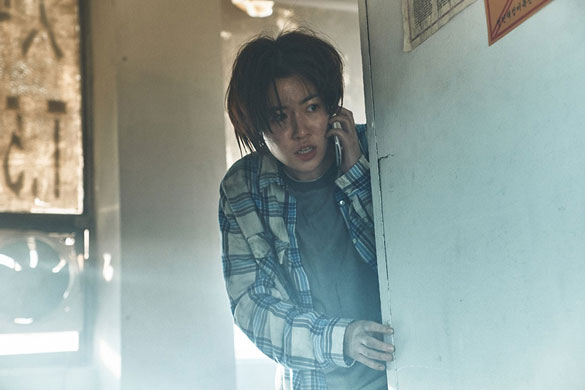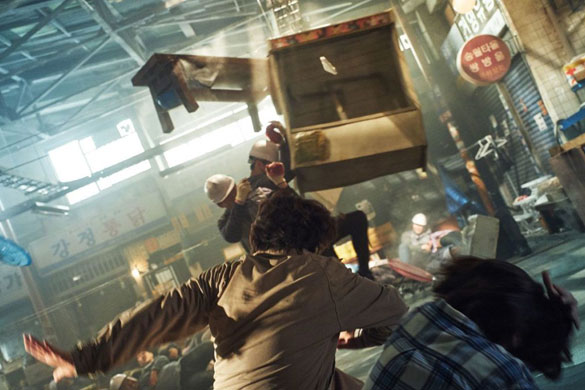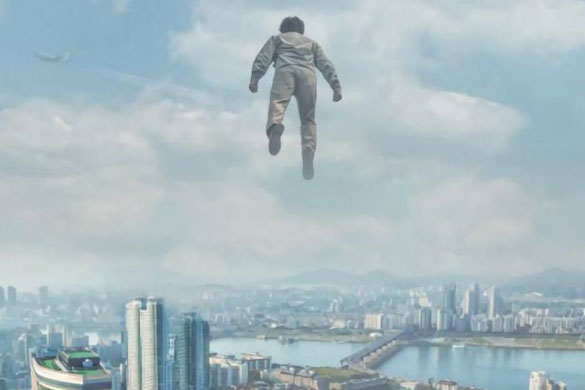
 |
||||
As part of Taesan Construction’s plans to build a sprawling shopping centre for Chinese tourists, the company's female head, Director Hong (Jung Yu-mi), brings in a group of baseball bat-wielding thugs led by President Min (Kim Min-jae) to forcibly evict the current tenants of retail establishments in the area, including Roo-mi (Shim Eun-kyung) who runs a highly popular fried chicken restaurant with her mother (Kim Young-sun).
Review: Psychokinesis begins with a small TV spot focusing on Roo-mi’s restaurant, showcasing her talent at frying chicken to perfection and pointing out the eatery’s huge popularity among locals. This quirky little scene swiftly and easily explain our heroine’s place in proceedings soon to unfold and not only does its deliberately over the top, almost cheesy humorous tone also warm viewers to her from the very outset but it also deftly belies and indeed significantly underlines the shocking, stark and brutal nature of an ensuing scene in which thugs smash in the windows of her restaurant, using baseball bats to attack her and other tenants attempting to stop them and in the process of the altercation cause the death of Roo-mi's mother. Those of you who have seen Yeon Sang-ho's previous live action feature, Train to Busan (his first live action work after a number of animations such as King of Pigs and The Fake), will already be aware of the director’s talent at switching pace, narrative focus and tone at almost the flick of a switch from seemingly warm, funny and carefree to dark, confrontational and callous, and with the shift in tone from the TV spot to the first confrontation with the thugs he uses that ability to superlative effect, leaving viewers virtually feeling that they too have moved from a position of ease to being almost bludgeoned over the head. From the very moment we are introduced to Seok-heon, it’s abundantly clear that he’s pretty much a loser. He knows it, Roo-mi knows it and with him being shown to have achieved next to nothing since walking out on Roo-mi and her mother – apart from being able to steal instant coffee sachets from his place of work without being caught – we are as painfully aware as he is that he has nothing whatsoever to offer his daughter even if she’d give him a chance, which she has no intention of doing. On discovering his new found powers, Seok-heon’s instant, gleeful thought is only to get a few gigs as a magician just to earn some money (for a change) but once he learns of the plight of Roo-mi and the other retailers he assumes that using his abilities to help them will enable him to start over with his daughter. He of course couldn’t be more wrong and he soon comes to the realisation that getting forgiveness from Roo-mi will be every bit as arduous a battle as the desperate efforts of the retailers to hold off the marauding thugs. As such, while Psychokinesis outwardly appears to be simply an almost throwaway Korean entry into the superhero genre, it is ultimately far more a story of family wrapped around copious social commentary.
However, though these darker or more heartfelt threads are both effective and wholly engaging, the decision by director Yeon Sang-ho to have the superpower elements in a significant portion of the film portrayed in a noticeably light-hearted, often over the top and even cheesy manner is on more than one occasion close to detrimental to them (cue Seok-heon gyrating his hips to quirky music to close a lock, and twirling his tongue repeatedly, while pretty much gurning, to secure a door chain while the thugs are brutally trying to break through the barrier separating them from the frightened retailers). Sure, I get that Yeon Sang-ho clearly wants Psychokinesis to be entertainment first and foremost and I am fully aware that any film with superhero elements can theoretically be a worthwhile platform for humour in some regard but the difference in tone between this and the thread detailing the ongoing, desperate plight of the bullied and brutalised retailers is so significant it is almost overly noticeable at times and when the two are brought together they sometimes feel that they are sitting at odds. Not only that, but aside from the otherworldly, superpower elements present (obviously), Psychokinesis is loosely based on (or, more accurately, inspired by) the real life Yongsan tragedy of 2009 in which a group of evictees of the Yongsan district of Seoul undertook a demonstration at an abandoned building as a result of not receiving what they felt was fair compensation for their forced relocation due to neighbourhood redevelopment. The police responded to this protest with an iron fist, bringing in SWAT teams, unleashing water cannons and using violent thugs to forcibly enter the building to round up demonstrators; ultimately resulting in the deaths of five protesters and one policeman. That fact raises the question of where the balance of humour and drama should lie in such a film, even if its inspiration has been fictionalised. Over the years from right back at the beginning of the New Korean Cinema wave of the late 90s and early 2000s, Korean film-makers have repeatedly shown themselves to be masters of the merging of genres within singular films (the combination of Love, Loss and Laughter in Korean cinema, if you will), but while the use of humour in darkly serious, fictional tales can deftly lighten the mood temporarily – both allowing a brief respite from, for example, brutal aspects and indeed perfectly increasing their shock value when they reappear – for narratives that even vaguely reference real-life tragedies that still linger in the Korean consciousness (or are clearly and obviously inspired by them), great care must be taken to maintain a level of respect for the subject matter. It’s a difficult call but I can’t help but feel that if Yeon Sang-ho had perhaps focused on a less volatile subject matter the chosen tones of the narrative would have sat more naturally together and the humour of the superpower element would have been far more welcome.Following fairly high opening box office figures, Korean audiences largely stayed away from Psychokinesis in droves, and I’d almost guarantee that a large part of the reason was their feeling that the film’s tone was somewhat disrespectful to the victims of Yongsan and their families, regardless of whether Yeon Sang-ho dressed his inspiration up as fictional.
Conversely, other humour present in Psychokinesis that is a step or more further away from the actual plight of the innocent retailers works rather well (for example, a so-called expert discussing Seok-heon’s telekinetic powers on television states his unshakeable belief that Seok-heon has hidden in his hand a wave-emitting device developed by North Korea that enables him to move things at a distance, going on the emphatically warn that the North Koreans have already infiltrated the South). Even the humour in the characterisation of Taesan Construction’s female head, Director Hong, as an (again) vastly over-the-top cartoonesque, profanity screaming woman with no qualms whatsoever about using whatever brutality against her employees that she feels she needs to in getting what she wants, manages to raise a smile as it too is a level further back from the ‘front line’, as it were; in the process fitting in with Yeon Sang-ho's well known negative feelings about corporate Korea. While the plight of the retailers overall does take up a significant amount of narrative time throughout the entire film, director Yeon Sang-ho is clearly as interested in telling the story of Seok-heon’s efforts to reconnect with his daughter and this sub-thread is easily one of the film’s strongest; helped greatly by a noticeable chemistry between Shim Eun-kyung and Ryu Seung-ryong with both providing performances worthy of their stature as two of the leading lights in Korea’s acting industry. Roo-mi and Seok-heon are ever so clearly and realistically shown to be ordinary, every-day Koreans who like all of us struggle with both life and relationships; Seok-heon’s superpower being simply the “McGuffin” that allows the two to reconnect.
PSYCHOKINESIS (염력) / 2018
|
||||
All images © Next Entertainment World, Netflix Review © Paul Quinn |
||||



